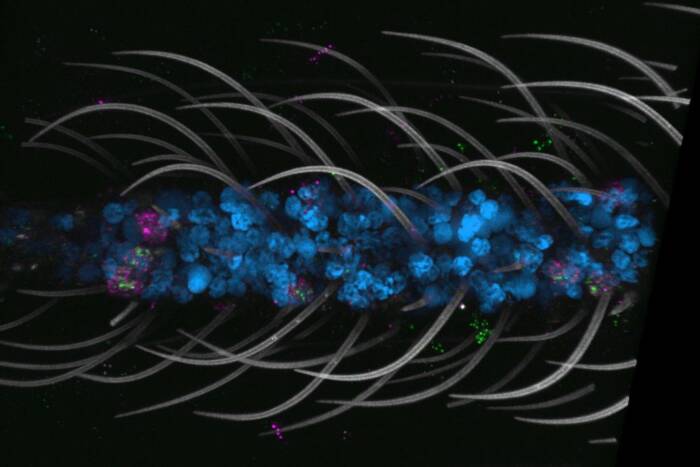Andrés C. Gottfried
B.S., National Autonomous University of Mexico
The Role of Microglia in the Effects of Steroid Hormones on Brain Inflammation
presented by Bruce S. McEwen (on behalf of himself and Karen Bulloch)
Andrés Blackmore Gottfried graduated from the National University of Mexico and came to Rockefeller University in 2001 with a Fulbright Scholarship to pursue his graduate studies with a keen interest in mechanisms governing the immune defense system of the body and, in particular, how it works in the brain. He did his first rotation in the immunology laboratory of Madhav Dhodapkar and then joined Karen Bulloch and me to work in the Laboratory of Neuroendocrinology to study how neuroendocrine mechanisms influence microglia, the major immune cell in the brain. His work evolved into a real adventure, filled with intrigue, perplexities, fun and excitement — the kind of experience all young scientists should have in graduate school.
The title of Andrés’s thesis is “The Role of Microglia in the Effects of Steroid Hormones on Brain Inflammation.” Steroid hormones include the sex hormones, such as estradiol and testosterone and the stress hormone cortisol. Both types of hormones have the important property of quelling inflammation and also regulating how the immune system functions within different regions of the body. Andrés showed that microglia have receptors that enable them to recognize and respond to estradiol and cortisol, but do not have detectable levels of receptors for other steroid hormones. He also found that microglia can transform steroid hormones to other steroid hormones — for example, testosterone to estradiol. In addition, Andrés found that, contrary to what others had claimed, microglial cells do not respond directly to estradiol for the suppression of inflammation. Rather, they can produce a steroid that mimics estrogen and can influence the estrogen receptors on other brain cells. He also found that microglia have an enhanced ability to regulate their own inflammatory response to cortisol. He was guided in this effort by Matt Hardy in the Population Council Laboratories and P. Harry Jellinck of Queens University in Canada.
Andrés has been a leader in the Rockefeller graduate student community and has a strong, kind interest in people. This interest has led him to attend medical school as his next career step, so he will be able to deal with real medical problems at a humanistic level, and he will begin medical studies in Mexico in the fall. Andrés’s progression here at Rockefeller is as much about his growth as a man and a scientist as anything we may have passed on to him. He comes from a family of engineers. His dad, Carlos, heads a company in Mexico that produces wind generators, which are increasingly important in this age of global climate change. Andrés is the first one in the family to do research and obtain a Ph.D. He shares his family’s strong commitment to the green movement and preservation of the natural world. Dr. Bulloch and I want to recognize Andrés’s parents, Carlos and Rosemary Gottfried, who deserve to be very proud of their son, and to also recognize members of Andrés’s family.



